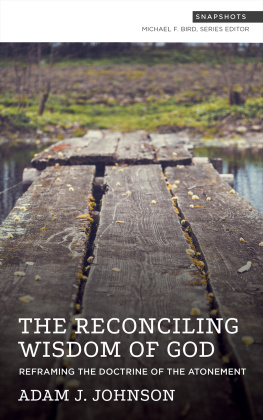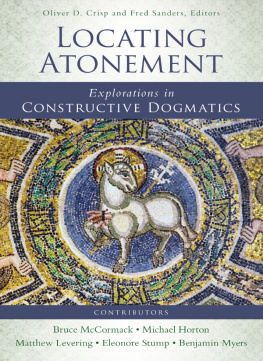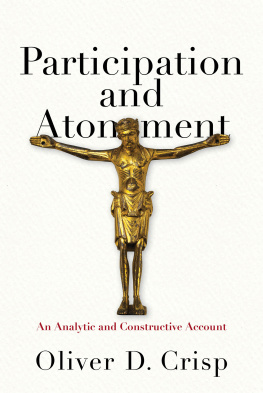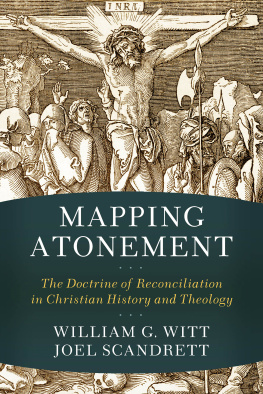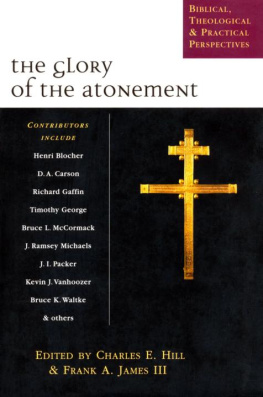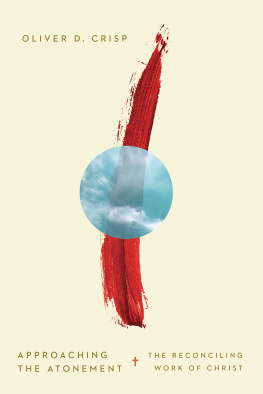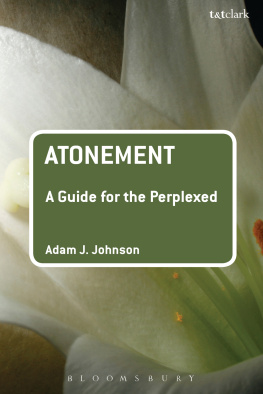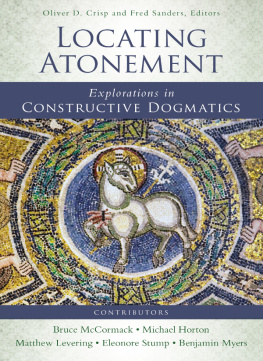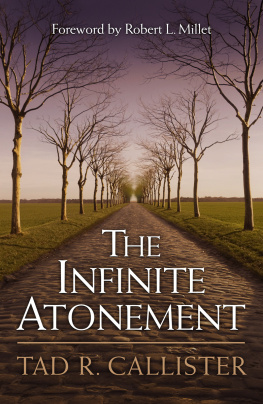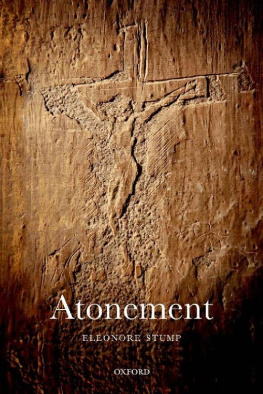Bird Michael F. - The Reconciling Wisdom of God Reframing the Doctrine of the Atonement
Here you can read online Bird Michael F. - The Reconciling Wisdom of God Reframing the Doctrine of the Atonement full text of the book (entire story) in english for free. Download pdf and epub, get meaning, cover and reviews about this ebook. year: 2016, publisher: Lexham Press, genre: Religion. Description of the work, (preface) as well as reviews are available. Best literature library LitArk.com created for fans of good reading and offers a wide selection of genres:
Romance novel
Science fiction
Adventure
Detective
Science
History
Home and family
Prose
Art
Politics
Computer
Non-fiction
Religion
Business
Children
Humor
Choose a favorite category and find really read worthwhile books. Enjoy immersion in the world of imagination, feel the emotions of the characters or learn something new for yourself, make an fascinating discovery.
- Book:The Reconciling Wisdom of God Reframing the Doctrine of the Atonement
- Author:
- Publisher:Lexham Press
- Genre:
- Year:2016
- Rating:4 / 5
- Favourites:Add to favourites
- Your mark:
- 80
- 1
- 2
- 3
- 4
- 5
The Reconciling Wisdom of God Reframing the Doctrine of the Atonement: summary, description and annotation
We offer to read an annotation, description, summary or preface (depends on what the author of the book "The Reconciling Wisdom of God Reframing the Doctrine of the Atonement" wrote himself). If you haven't found the necessary information about the book — write in the comments, we will try to find it.
The Reconciling Wisdom of God Reframing the Doctrine of the Atonement — read online for free the complete book (whole text) full work
Below is the text of the book, divided by pages. System saving the place of the last page read, allows you to conveniently read the book "The Reconciling Wisdom of God Reframing the Doctrine of the Atonement" online for free, without having to search again every time where you left off. Put a bookmark, and you can go to the page where you finished reading at any time.
Font size:
Interval:
Bookmark:

THE RECONCILING WISDOM OF GOD
REFRAMING THE DOCTRINE OF THE ATONEMENT
Snapshots
Michael F. Bird, Series Editor
Adam J. Johnson

The Reconciling Wisdom of God: Reframing the Doctrine of the Atonement
Snapshots
Copyright 2016 Adam J. Johnson
Lexham Press, 1313 Commercial St., Bellingham, WA 98225
LexhamPress.com
You may use brief quotations from this resource in presentations, articles, and books. For all other uses, please write Lexham Press for permission. Email us at .
Unless otherwise noted, Scripture quotations are from the ESV Bible (The Holy Bible, English Standard Version) ( ESV ), copyright 2001 by Crossway Bibles, a publishing ministry of Good News Publishers. Used by permission. All rights reserved.
Scripture quotations marked ( KJV ) are from the King James Version. Public domain.
Scripture quotations marked ( NASB ) are from the New American Standard Bible , Copyright 1960, 1962, 1963, 1968, 1971, 1972, 1973, 1975, 1977, 1995 by The Lockman Foundation. Used by permission.
Scripture quotations marked ( NIV ) are from the Holy Bible, NEW INTERNATIONAL VERSION. Copyright 1973, 1978, 1984 by Biblica, Inc. Used by permission. All rights reserved worldwide.
Print ISBN 9781577997252
Digital ISBN 9781577997269
Series Editor: Michael F. Bird
Lexham Editorial: Elliot Ritzema, Abigail Stocker, Joel Wilcox
Cover Design: Jim LePage
Back Cover Design: Liz Donovan
Father, Son and Holy Spirit,
grant a double share of your wisdom
to my three sons,
Reuben, Nathan, and Simeon,
to whom I dedicate this book.
Also in the Snapshots series:
Transformation: The Heart of Pauls Gospel
by David A. deSilva
Heirs of Promise: The Church as the New Israel in Romans
by P. Chase Sears
For updates on this series, visit LexhamPress.com
TABLE OF CONTENTS
T his short book on wisdom has progressed through a variety of stages. A number of friends, mentors, and publishers lie in its wake, deserving their respective tips of the hat.
The earliest version was a research paper for Prof. Sang Lee at Princeton Theological Seminary, and I thank both him and Prof. Daniel Migliore for their encouragement in this project.
Subsequently, this topic took shape as a paper presented at the Los Angeles Theology Conference in 2015 , co-written with Kyle Strobel. It was later published as part of the conference proceedings in Locating Atonement: Explorations in Constructive Dogmatics . I would like to thank Kyle for this great experience, as well as Katya Covrett, Oliver Crisp, and Fred Sanders for their help and encouragement, and for the excellent conference they have developed over the last few years.
A research fellowship at Biola Universitys Center for Christian Thought (CCT), made possible through the support of a grant from the John Templeton Foundation, provided me with the time to write this book. While the opinions expressed in this publication are my own and do not necessarily reflect the views of the John Templeton Foundation or the CCT , I benefited greatly from the friendship, insight, and questions of the other fellows. I am particularly grateful for the leadership provided by Tom Crisp, Gregg Ten Elshof, and Steve Porter within the CCT , and from the friendship and help of Evan Rosa, the CCT assistant director. Laura Smit provided some exceptionally helpful recommendations and sources, and Kent Dunnington helped me appreciate the ways that the metaphysical and theological commitments of our religious commitments shape our understandings of different intellectual virtues.
Brannon Ellis, the acquisitions editor at Lexham Press, was the one who originally approached me about writing a short, yet (hopefully) creative, introductory text on the doctrine of the atonement, and then oversaw the editing and publishing of this book. Without his instigation and encouragement, I would not have embarked on this project.
As usual, a number of friends and students contributed in various ways to this project. I would like to think Glen and Susie Johnson, Scott Harrower, Matt Jenson, Ryan Peterson, Fred Sanders, Ben Sutton, and Jeremy Treat. Yet again Rachael Smith, my research assistant, was beyond helpful in a number of ways for this project. The broader community and culture within Biola University and the Torrey Honors Institute continues to push, encourage, and stimulate me. A greater contribution still lies with my wife, Katrina, and our sons, Reuben, Nathan, and Simeon: thank you for the balance and joy you bring to my life, which in turn gives me energy and joy for my work as a teacher and theologian.
And while this may be a little unusual, I would be utterly remiss if I did not express my profound thanks to Jonathan Edwards , whose set of sermons entitled The Wisdom of God in the Way of Salvation unlocked for me the doctrine of the atonement. I cannot imagine how my view of Christs saving work would look today were it not for his preachingmy debt of gratitude is insurmountable.
T here are any number of ways to tell a good story. It can begin with scenes of everyday life and gradually swell to epic proportions, as in Tolkiens Lord of the Rings. It can begin in the middle before looking back for context, as in Homers Odyssey . It can focus on a single individual or, like Hugos Les Misrables , weave together the lives of countless characters and families. Each has its limitations, and each has its way of gripping uspulling us in so that we find ourselves caught up in the movement and action. There is no one right way to do it.
The doctrine of the atonement, no less than the Battle of Gettysburg or the Adventures of Tom Sawyer , is a matter of telling a story, or retelling Gods story. One can do it any number of ways. At its heart, the atonement is a story, a history; and as with all stories, this telling is an art. The purpose of this book is to retell the story of Christs atonement in a way that energizes future tellings in ever new and faithful ways.do this, we will not begin at the beginningnot in Jerusalem with the death and resurrection of Jesusbut in Sweden in 1930 .
Gustaf Auln , a Swedish theologian, sought to move past the division he perceived between the rationalistic Lutheran orthodoxy and the liberal theology of his day. To do so, he developed a historical and theological account of the atonement, positing three major periods in the history of the church.
The next half millennium or more was dominated by versions of the satisfaction theory (developed by Anselm of Canterbury), in which Christ in some way satisfies the honor or justice of God through his death. This theory prioritizes the relationship between God and humankind, emphasizing that which we owed to God yet could not pay, whether that be honor, justice, or otherwise. The burden of the argument falls on the way or ways in which Jesus Christ restores to God that which we owe, that in him we might be restored to right relations with God. Penal substitution is a version of this theory, wherein Jesus satisfied God by enduring the punishment we ought to have suffered for our sin.
The third period owed much to Peter Abelards exemplarist or subjective theory, in which Christs death transforms us through its inspiring example. Abelards thought has been significantly reinterpreted in the last several decades, but this theory remains one of the most influential interpretations of the work of Christ, drawing our attention to the role of Christs life in our salvation. While few (if any) theologians would deny this aspect of Christs ministry, some (particularly during the Enlightenment and beyond) have made it the central or sole aspect of Christs work.
Font size:
Interval:
Bookmark:
Similar books «The Reconciling Wisdom of God Reframing the Doctrine of the Atonement»
Look at similar books to The Reconciling Wisdom of God Reframing the Doctrine of the Atonement. We have selected literature similar in name and meaning in the hope of providing readers with more options to find new, interesting, not yet read works.
Discussion, reviews of the book The Reconciling Wisdom of God Reframing the Doctrine of the Atonement and just readers' own opinions. Leave your comments, write what you think about the work, its meaning or the main characters. Specify what exactly you liked and what you didn't like, and why you think so.

